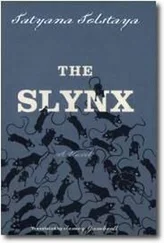Denisov reflected on Australia irritatedly; on his fiancee, Lora, distractedly. Everything had already been pretty much decided; sooner or later he intended to become her fourth husband, not because she lit up the world, as the saying goes, but because with her no light was needed. In the light she talked incessantly, saying whatever came into her head.
“An awful lot of women,” said Lora, “dream of having a tail. Think about it yourself. First of all, wouldn’t it be pretty—a thick fluffy tail, it could be striped, black and white, for example—that would look good on me—and you know, on Pushkin Square I saw a little fur coat that would have been just the thing for that kind of tail. Short, with wide sleeves, and a shawl collar. It would go with a black skirt like the one that Katerina Ivanna made for Ruzanna, but Ruzanna wants to sell, so just imagine—if you had a tail, you could get by in a coat without a collar. Wrap it around your neck—and you’re all warm. Then, say you’re going to the theater. A simple open dress, and over it—your own fur. Fabulous! Second, it would be convenient. In the metro you could hold on to the straps with it; if it’s too hot—you’ve got a fan; and if someone gets fresh—slap him with your tail! Wouldn’t you like me to have a tail?… What do you mean, you don’t care?”
“Ah, my beauty, I should have your worries,” Denisov said morosely.
But Denisov knew that he himself was no prize—with his smoke-stale jacket, his ponderous thoughts, his nocturnal heart palpitations, his predawn fear of dying and being forgotten, being erased from human memory, vanishing without a trace in the air.
Half of his earthly life was behind him, ahead lay the second half, the bad half. At this rate Denisov would just whir over the earth and depart, and no one would have reason to remember him! Petrovs and Ivanovs die every day, their simple names are carved in marble. Why couldn’t Denisov linger on some memorial plaque, why couldn’t his profile grace the neighborhood of Orekhovo-Borisovo? “In this house I dwell…. ” Now he was going to marry Lora and die—she wouldn’t have it in her to make an appeal to the place where these things are decided, whether or not to immortalize… “Comrades, immortalize my fourth husband, okay? Comrades, pleeease.” “Ho-ho-ho…” Who was he anyway, in point of fact? He hadn’t composed anything, or sung anything, or shot anyone. He hadn’t discovered anything new and named it after himself. And for that matter, everything had already been discovered, enumerated, denominated; everything alive and dead, from cockroaches to comets, from cheese mold to the spiral arms of abstruse nebulae. Take some old virus—swill, worthless rubbish, couldn’t make a chicken sneeze, but no, it’s already been grabbed, named, and adopted by a couple of your scholarly Germans—just have a look at today’s paper. If you think about it—how do they share it? They probably found the useless bit of scum in some unwashed glass and fainted from happiness—then the shoving and shouting started: “Mine!” “No, mine!” They smashed eyeglasses, ripped suspenders, gave each other a thrashing, puffed and panted, then sat down with the glass on the sofa and embraced: “Hey, pal, let’s go fifty-fifty!” “All right, what can I do with you?…”
People assert themselves, sink their hooks in, refuse to go— it’s only natural! Take the recording of a concert, for example. A hush falls over the hall, the piano thunders, the keys flash like lozenges gone berserk, lickety-split, hand over fist, wilder and wilder; the sweet tornado swirls, the heart can’t stand it, it’ll pop right out, it quivers on the last strand, and suddenly: ahem. Ahe he kherr hem. Khu khu khu. Someone coughed. A real solid, throaty cough. And that’s that. The concert is branded from birth with a juicy, influenza stamp, multiplied on millions of black suns, dispersed in all possible directions. The heavenly bodies will burn out, the earth will become crusted in ice, and the planet will move along inscrutable stellar paths like a frozen lump for all time, but that smart aleck’s cough won’t be erased, it won’t disappear, it will be forever inscribed on the diamond tablets of immortal music—after all, music is immortal, isn’t it?—like a rusty nail hammered into eternity; the resourceful fellow asserted himself, scribbled his name in oil paint on the cupola, splashed sulfuric acid on the divine features.
Hmmm.
Denisov had tried inventing things—nothing got invented. He had tried writing poems—they wouldn’t be written. He started a treatise on the impossibility of Australia’s existence: He made himself a pot of strong coffee and sat at the table all night. He worked well, with élan, but in the morning he reread what he had written, tore it up, cried without shedding tears, and went to sleep in his socks. It was soon after this that he met Lora and was nourished, listened to, and comforted many a time, both at his place in Orekhovo-Borisovo, where the captain of course drenched them in a golden rain, draining his Kingston valves again, as well as in her messy little apartment, where something rustled in the hallway all night.
“What is that,” asked Denisov, alarmed, “not mice?”
“No, no, go to sleep, Denisov, it’s something else. I’ll tell you later. Sleep!”
What was there to do? He slept, dreamt nasty dreams, woke up, thought over what he’d dreamt, and dozed off again, and in the morning he drank coffee in the kitchen with the sweet-smelling Lora and her widower father, a retired zoologist, a most gentle old man, blue-eyed, a bit on the strange side—but who isn’t a bit strange? Papa’s beard was whiter than salt, his eyes clearer than spring; he was quiet, quick to shed tears of joy, a lover of caramels, raisins, rolls with jam; he bore no resemblance to the noisy, excitable Lora, all gold and black. “You know, Denisov, my papa’s wonderful, a real dove of peace, but I’ve got problems with him, I’ll tell you about it later. He’s so sensitive, intelligent, knowing, he could go on working and working, but he’s retired—some ill-wishers schemed against him. He gave a paper in his institute on the kinship of birds and reptiles or crocodiles or something—you know what I mean, right?—the ones that run and bite. But the research director’s last name is Bird, so he took it personally. These zoologists are always on the lookout for ideological rot, because they haven’t decided yet whether man is actually a monkey or if it just seems that way. So they sacked poor Papa, bless his heart, now he stays at home, cries, eats, and popularizes. He writes those, you know, notes of a phenologist, for magazines, well, you know what I mean. On the seasons, on toads, why the cock crows, and what it is that makes elephants so cute. He writes really well, none of that wishy-washy puffery, but like an educated person, plus he’s lyrical. Poppykins, I tell him, you’re my Turgenev—and he cries. Love him, Denisov, he deserves it.”
His head lowered, sad and humble, Lora’s snow-white papa listened to her monologues, dabbed the corners of his eyes with a handkerchief, and shuffled off to his study with little steps. “Shhhhh,” whispered Lora, “quiet now…he’s gone to popularize.” The study is silent, desolate, the shelves are cracking, the encyclopedias, reference books, yellowed journals, and packets with reprints of someone’s articles are all gathering dust—everything is unneeded, disintegrating, grown cold. In a corner of the necropolis, like a solitary grave, stands Papa’s desk, a pile of papers, copies of a children’s magazine: Papa writes for children; Papa squeezes his many years of knowledge into the undeveloped heads of Young Pioneers; Papa adapts, squats, gets down on all fours; noise, exclamations, sobs, and the crackle of ripping paper issue from the study. Lora sweeps up the scraps, it’s all right, he’ll calm down now, now everything will work out. Papa’s on the wolf today, he’s tackling the wolf, he’s bending him, breaking, squeezing him into the proper framework. Denisov looked distractedly at the swept-up scraps:
Читать дальше












